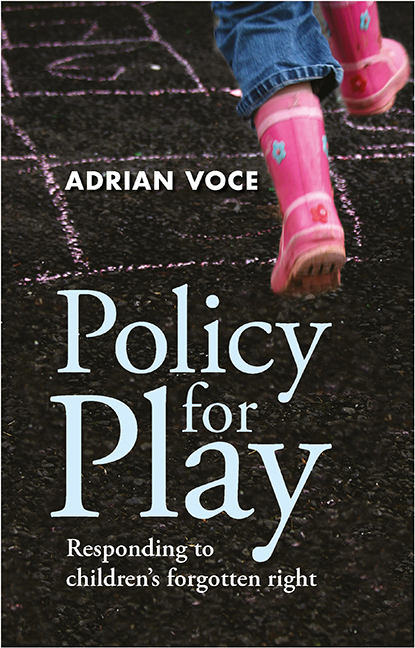Book contents
- Frontmatter
- Dedication
- Contents
- Who’s who
- About the author
- Preface
- Foreword
- Prologue
- Introduction ‘To respect, protect and fulfil’
- one ‘To play and to dream’ • Restoring play to the heart of the campaign for children’s rights
- two ‘For a change’ • Finding the evidence for play policy
- three ‘Advocates for play’ • Playwork’s place at the heart of the play movement
- four ‘New opportunities’ • Lottery funding and the beginnings of public play policy
- five ‘A vital and vibrant city’ • How devolved government in London set a benchmark for play policy
- six ‘Making the case’ • The call for a national play strategy
- seven ‘Things to do, places to go?’ • How play was overlooked by children’s services reform
- eight ‘Getting serious’ • The national play review
- nine ‘Lottery millions’ • The Children’s Play Initiative
- ten ‘Dirt is good’ • The Play England project
- eleven ‘The best place in the world’ • The Play Strategy for England
- twelve ‘Playbuilders’ • Breaking the mould of the public playground
- thirteen ‘Everyday adventures?’ • Austerity brings an end to play policy in England
- fourteen ‘Skylarks and canaries’ • The legacy of the Play Strategy
- fifteen ‘Children now’ • Responding to children’s right to play: conclusions and recommendations
- Epilogue
- References
- Index
five - ‘A vital and vibrant city’ • How devolved government in London set a benchmark for play policy
Published online by Cambridge University Press: 08 March 2022
- Frontmatter
- Dedication
- Contents
- Who’s who
- About the author
- Preface
- Foreword
- Prologue
- Introduction ‘To respect, protect and fulfil’
- one ‘To play and to dream’ • Restoring play to the heart of the campaign for children’s rights
- two ‘For a change’ • Finding the evidence for play policy
- three ‘Advocates for play’ • Playwork’s place at the heart of the play movement
- four ‘New opportunities’ • Lottery funding and the beginnings of public play policy
- five ‘A vital and vibrant city’ • How devolved government in London set a benchmark for play policy
- six ‘Making the case’ • The call for a national play strategy
- seven ‘Things to do, places to go?’ • How play was overlooked by children’s services reform
- eight ‘Getting serious’ • The national play review
- nine ‘Lottery millions’ • The Children’s Play Initiative
- ten ‘Dirt is good’ • The Play England project
- eleven ‘The best place in the world’ • The Play Strategy for England
- twelve ‘Playbuilders’ • Breaking the mould of the public playground
- thirteen ‘Everyday adventures?’ • Austerity brings an end to play policy in England
- fourteen ‘Skylarks and canaries’ • The legacy of the Play Strategy
- fifteen ‘Children now’ • Responding to children’s right to play: conclusions and recommendations
- Epilogue
- References
- Index
Summary
With a strong playwork tradition and more adventure playgrounds (Shier, 1984) and play associations than anywhere else in the country, it was perhaps no surprise that the big breakthrough for play policy in England occurred in London. However, there were political factors, unique to the capital, which were to have an equally significant bearing on events.
When New Labour won its landslide victory under Tony Blair in the general election of 1997, its policy on London contained something of a conundrum of realpolitik. Blair and his chancellor, Gordon Brown, had led an extensive modernising agenda with a more business-friendly political culture than previous Labour governments had a reputation for. For example, key Blairite, Peter Mandelson (cited in Wighton, 1998) declared the party to be ‘intensely relaxed about people getting filthy rich, as long as they pay their taxes’. For the traditional party of the working class this was something of a departure and was to set Downing Street on a collision course with the heir apparent to the London throne.
In 1986, the Conservative government of Margaret Thatcher had abolished the Greater London Council (GLC), led by ‘Red’ Ken Livingstone, after which he became a champion of the left-wing of the Parliamentary Labour Party, standing against Tony Blair for the leadership after the sudden death of John Smith in 1994. Upon the party’s 1997 victory it was no surprise, given his uncompromising stance on socialist principles, that Livingstone was passed over for ministerial duties. Just as he had been a bête noire for Prime Minister Margaret Thatcher – opposing everything she stood for from his alternative power base across the Thames – so he now became, this time from the backbenches, a thorn in the side of the Blair government; New Labour’s ‘Bête Rouge’ (Rawnsley, 2001). The conundrum for Blair was that Labour had opposed the abolition of the GLC and had an established policy to reinstate some form of devolved regional government for the capital: an authority that Ken Livingstone was widely regarded as the natural candidate to lead.
By 1999, Livingstone had become one of New Labour’s most vocal internal critics and Blair was determined that he should not be Labour’s official candidate.
- Type
- Chapter
- Information
- Policy for PlayResponding to Children's Forgotten Right, pp. 51 - 62Publisher: Bristol University PressPrint publication year: 2015



